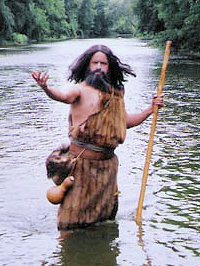John the Baptist’s preaching is a window into what at least some Jews believed about the coming messianic age. For the most part, there was a consistent belief that the Lord himself would intervene in some way in history and render judgment. Israel’s enemies will be destroyed and the nation gathered in a restored kingdom in the land promised to Abraham. Both Matthew and Luke describe John as declaring that this judgment would be made by a messiah, who is coming soon.
The day of judgment is near in the preaching of John: the axe is to the root, branches which do not produce fruit will be thrown into fire (10). His winnowing fork is already in the hand of the coming one and he is ready to clear his threshing floor (12), consigning the chaff to unquenchable fire (12). The general image John is using is of a final harvest and separation and judgment of those who have not repentant (branches, chaff). This is an good example of continuity between John and Jesus, compare the image of burning fruitless branches here to Matt 7:19, the same phrase is used, Matt 13:29, bundles of weeds are to be burned, Mt 13:42, the tares are to be burned.
While the imagery is agricultural, it is also violent. An ax is a tool, but this particular word can also be a vicious weapon (Jer 26:22). Branches which do not bear fruit are to be pruned, but the sense here is “to sever completely, to mutilate” (Philo, Spec Leg. 3.179.), to gouge out eyes (PssSol 4:20, Antiq. 10.140), and to totally eradicate something (Job 19:10, 4 Mac 3:2-4). This harvest language is frequent in the Hebrew Bible and the literature of the Second Temple.
While Malachi 4:1 (MT 3:19) compares the day of the Lord to a furnace or an oven, it is Isaiah which seems to be the source for the rich imagery of John’s sermon. It is not surprising that these same texts appear frequently among the DSS applied to the time of the Messiah. Isaiah 30:30-33 is a close parallel to John’s imagery. There the Lord’s raging anger and consuming fire judge Assyria. Verse 33 develops theme of a burning fire in great detail as a fire pit made deep and long, which is ignited by the breath of the Lord like a stream of burning sulfur.
The image of a fiery judgment is very common in the intertestamental literature, I will only summarize a few from the Psalms of Solomon here since that book dates nearest to the time of John’s preaching. In PsSol 15:4-5 the “flame of fire and anger” going out from the Lord to destroy the sinner. PsSol 12:2 compares the wicked man’s tongue to a scorching fire and prays for the Lord to deliver the devout by destroying the slanderous in fire (12:4). Based on Jeremiah 4:11-12, PsSol 8:2 compares the onslaught of invaders to a “raging firestorm sweeping through the wilderness.”

A major difference between John’s sermon and the fiery judgment scenes surveyed above is the motif of separation. When messiah comes there will be a separation, not of Israel from the oppressing gentiles, the enemies, the Kittim, etc, but of true Israel from false. At the harvest Israel itself will be shifted. Recall that John is addressing a cross section of Israel and telling them that they are facing a coming fiery judgment if they do not repent. The fate of the unrepentant Israelite is the same as for the gentile – fiery, violent destruction.
If this is the judgment that John expected, what happened to it? Was he wrong about a coming fiery judgment ? Did John misinterpret the words of Isaiah? How do the words of John the Baptist foreshadow the work of the Messiah especially in Luke / Acts?

